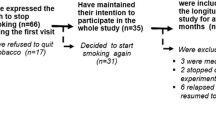Abstract
In a group of heavy smokers, overnight abstinence from smoking facilitated the perception of briefly presented smoking words. Subjects in the nicotineabstinent condition accurately identified significantly more smoking-related words than food-related or neutral words. However, a group tested in a non-abstinent condition showed no significant differences in ability to identify the three different word types. Smokers deprived of cigarettes were also significantly better able to categorize smoking words than non-abstinent subjects. These results demonstrate an abstinence-based facilitation of processing smoking-related stimuli at the semantic level, consistent with the hypothesis that smoking-related concepts are activated, or primed, during deprivation from nicotine.
Similar content being viewed by others
References
Bjork RA, Gross TM, Daggett D (1991) Cognitive testing system. UCLA Department of Psychology, Leviathan Development, Los Angeles, Calif
Bower GH (1981) Mood and memory. Am Psychologist 36:129–148
Bower GH (1987) Commentary on mood and memory. Behav Res Ther 25:443–455
Burgess IS, Jones LM, Robertson SA, Radcliffe WM, Emerson E (1981) The degree of control exerted by phobic and non-phobic verbal stimuli over the recognition behavior of phobic and non-phobic subjects. Behav Res Ther 19:233–243
Channon S, Hayward A (1990) The effect of short-term fasting on processing of food cues in normal subjects. Int J Eating Disord 9:447–452
Channon S, Helmsley D, de Silva P (1988) Selective processing of food words in anorexia nervousa. Br J Clin Psycho 27:259–260
Gross TM, Jarvik ME, Rosenblatt MR (1993) Nicotine abstinence produces content-specific stroop interference. Psychopharmacology 110:333–336
Hatsukami DK, Hughes JR, Pickens RW (1985) Blood nicotine, smoke exposure and tobacco withdrawal symptoms. Addict Behav 10:413–417
Hughes JR, Keenan RM, Yellin A (1989) Effect of tobacco withdrawal on sustained attention. Addict Behav 14:577–580
Hughes JR, Higgins ST, Hatsukami D (1990) Effects of abstinence from tobacco. In Kozlowski LT et al. (eds) Research advances in alcohol and drug problems, vol. 10. Plenum, New York, pp 317–398
MacLeod C, Mathews A, Tata P (1986) Attentional bias in emotional disorders. J Abnorm Psychol 95:15–20
Mathews A, MacLeod C (1985) Selective processing of threat cues in anxiety states. Behav Res Ther 23:563–569
Mathews A, MacLeod C (1986) Discrimination of threat cues without awareness. J Abnorm Psychol 95:131–138
Mathews A, Mogg K, May J, Eysenck M (1989) Implicit and explicit memory bias in anxiety. J Abnorm Psychol 98:236–240
McNally RJ, Foa EB (1986) Anxious mood and memory. Behav Res Ther 27:141–147
McNally RJ, Riemann BC, Louro CE, Lukach BM, Kim E (1992) Cognitive processing of emotional information in panic disorder. Behav Res Ther 30:143–149
McNally RJ, Amir N, Louro CE, Lukach BN, Riemann BC, Calamari JE (1994) Cognitive processing of idiographic emotional information in panic disorder. Behav Res Ther 32:119–122
Parkinson L, Rachman S (1980) Are intrusive thoughts subject to habituation? Behav Res Ther 18:409–418
Snyder FR, Henningfield JE (1989) Effects of nicotine administration following 12 h of tobacco deprivation: assessment on computerized performance tasks. Psychopharmacology 97:17–22
Snyder FR, Davis F C, Henningfield JE (1989) The tobacco withdrawal syndrome: performance decrements assessed on a computerized test battery. Drug Alcohol Dependence 23:259–266
Tiffany ST (1990) A cognitive model of drug urges and drug-use behavior: role of automatic and nonautomatic processes. Psychol Rev 2:147–168
Thorndike EL, Lorge I (1944) The teacher's word book of 30,000 words. Bureau of Publications, Teachers College, Columbia University, New York
Warburton DM, Wesnes K, Shergold K, James M (1986) Facilitation of learning and state dependency with nicotine. Psychopharmacology 89:55–59
Author information
Authors and Affiliations
Rights and permissions
About this article
Cite this article
Jarvik, M.E., Gross, T.M., Rosenblatt, M.R. et al. Enhanced lexical processing of smoking stimuli during smoking abstinence. Psychopharmacology 118, 136–141 (1995). https://doi.org/10.1007/BF02245831
Received:
Revised:
Issue Date:
DOI: https://doi.org/10.1007/BF02245831




